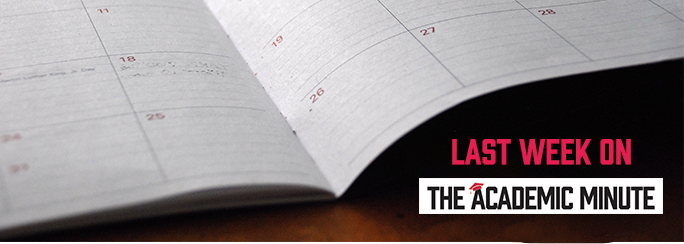
The Academic Minute from 4.14 – 4.18
Monday
Gabe Kwong – Georgia Tech University
Using Computer Logic to Enhance Cancer Detection
Gabe A. Kwong, Ph.D. is the Robert A. Milton Endowed Chair and Associate Professor of Biomedical Engineering at Georgia Tech and Emory School of Medicine. Dr. Kwong’s research program is centered at the interface of bioengineering, immunology, and medicine. His groundbreaking accomplishments in advancing biosensors and cell therapies to address frontier challenges in biomedicine, particularly within oncology, have resulted in first-in-class biotechnologies, the founding of multiple start-up companies, and widespread recognition. Among his distinctions, Dr. Kwong is a recipient of the NIH Director’s New Innovator and Pioneer Awards, and currently leads the $49.5 million Cancer and Organ Degradome Atlas (CODA) project, a multi-institutional research enterprise supported by ARPA-H to revolutionize multi-cancer early detection. Dr. Kwong co-founded 2 biotechnology companies and holds 40 issued or pending patents. He earned his B.S. from UC Berkeley, his Ph.D. from Caltech, and completed postdoctoral studies at MIT.
Tuesday
Sarah Kakadellis – University of California Davis
States Unlikely to Meet U.S. Food Waste Reduction Goals
Kakadellis’ research addresses the significant yet mostly untapped potential of food loss and waste solutions for the design of sustainable, circular, and resilient food systems. She is particularly interested in assessing the environmental and social dimensions of food waste reduction policies and technology adoption. She holds a B.Sc. in Biochemistry, an M.Sc. in Environmental Technology, and an interdisciplinary Ph.D. in Environmental Policy. Sarah is also a keen science communicator and is committed to bringing her research to policymakers and the public through outreach activities.
Wednesday
Jasmine Loveland – University of Vienna
A Super Enzyme in Overdrive: How Ruffs Lower Testosterone
Dr. Jasmine Loveland is a postdoctoral researcher at the University of Vienna and a guest scientist at the Max Planck Institute for Biological Intelligence. Her main interests are in molecular evolution, comparative neuroanatomy and the evolution of animal behavior. Dr. Loveland received her BA from Hampshire College, a MSc from Smith College and a PhD in Biology from Stanford University. She has published articles on a wide variety of topics, including evolution of bacterial ribozymes, taste processing in the brain, and neural correlates for social behaviors in fishes and birds. Most recently, her research combines behavior, hormones, neuroanatomy and gene expression analyses to understand how alternative mating tactics link to a chromosome inversion in male ruffs. Her most recent paper, published in Science, describes how a super enzyme helps male ruffs lower testosterone levels in their blood.
Thursday
Anita Rao – Georgetown University
The Impact of Voluntary Labeling
Anita Rao, Beyer Family Associate Professor at Georgetown University’s McDonough School of Business, is an empirical marketing researcher. Her work focuses on causally measuring consumer reactions to deceptive practices such as false claims, fake news ads and misinformation. She was recently a visiting scholar at the Federal Trade Commission, Bureau of Economics and is a senior policy scholar at Georgetown McDonough’s Center for Business and Public Policy. Rao was named a 2019 Marketing Science Institute (MSI) Young Scholar and a 2023 MSI Scholar.
Friday
Peter Serles – California Institute of Technology
Machine Learning Could Make Superefficient Planes
Dr. Peter Serles received his PhD from the University of Toronto working with Prof. Tobin Filleter where he was a Vanier Scholar and was awarded the Canadian Society for Mechanical Engineers Gold Medal. Dr. Serles is now a Schmidt Science Fellow at Caltech and USC Stem Cell. His research seeks to cross disciplinary boundaries by combining nanomaterials, additive manufacturing, stem cell development, and computational techniques to find outcomes that no single discipline could achieve.

